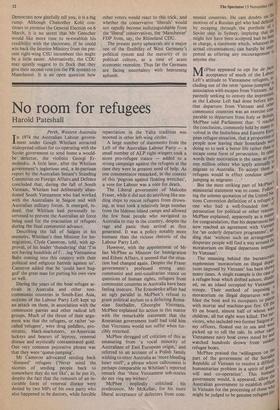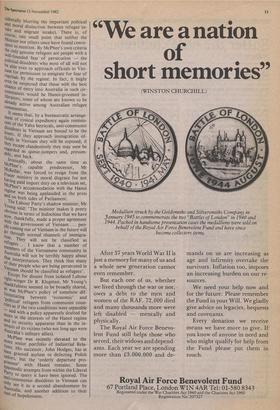No room for refugees
Harold Pateshall
Perth, Western Australia In 1974 the Australian Labour govern- ment under Gough Whitlam attracted widespread odium for co-operating with the Soviet government to send home a would- be defector, the violinist Georgi Er- molenko. A little later, after the Whitlam government's inglorious end, a bi-partisan report by the Australian Senate's Standing Committee on Foreign Affairs and Defence concluded that, during the fall of South Vietnam, Whitlam had deliberately aban- doned South Vietnamese who had worked with the Australians in Saigon and with Australian military forces. It emerged, in- deed, that Whitlam had personally in- tervened to prevent the Australian air force being used for the evacuation of refugees during the final communist advance.
Describing the fall of Saigon in his memoirs, Whitlam's then Minister for Im- migration, Clyde Cameron, told, with ap- proval, of his leader 'thundering' that 'I'm not having hundreds of f ...ing Vietnamese Baits coming into this country with their political and religious hatreds against us'. Cameron added that he 'could have hug- ged' the great man for putting his own view so well.
During the years of the boat refugee ar- rivals in Australia and other non- communist countries in South-East Asia, sections of the Labour Party Left kept up an attack on them, in association with the communist parties and other radical left groups. Much of the thrust of their argu- ment was that the refugees, or rather 'so- called refugees', were drug peddlers, pro- stitutes, black-marketeers, ex-American lackeys and bearers of leprosy, venereal disease and mystically contaminated gold. One very common pejorative phrase was that they were 'queue-jumping'.
Mr Cameron advocated sending back 'diseased' refugees ('Never mind the niceties of sending people back to somewhere they do not like', as he put it), despite the fact that the rumours of an in- curable form of venereal disease were denied by two MPs of his own party who also happened to be doctors, while forcible repatriation in the Yalta tradition was mooted in other left-wing circles.
A large number of statements from the Left of the Australian Labour Party — a small number of ALP right-wingers took a more pro-refugee stance — added to a strong campaign against the refugees at the time they were in greatest need of help. As one commentator remarked, in the context of this 'pogrom against floating wretches', a vote for Labour was a vote for death.
The Liberal government of Malcolm Fraser, while it did not do anything like sen- ding ships to rescue refugees from drown- ing, at least took a relatively large number from the hideous island camps and allowed the few boat people who navigated to Australia to stay in the country, despite the rage and panic their arrival at first generated. It was a policy notably more humane than the vicious rhetoric of the Labour Party Left.
However, with the appointment of Mr Ian McPhee as Minister for Immigration and Ethnic Affairs, it seemed that the situa- tion had changed again. Despite the Fraser government's professed strong anti- communist and anti-totalitarian stance on questions of human rights, refugees from communist countries in Australia have been feeling insecure. The Ermolenko affair had an ugly parallel in McPhee's refusal to grant political asylum to a defecting Roma- nian footballer, Gheorghe Viscreanu. McPhee explained his action in this matter with the remarkable statement that the Romanian government itself had told him that Viscreanu would not suffer when for- cibly returned.
McPhee shrugged off criticism of this as emanating from 'a vocal minority of Australians of East European origin,' and referred to an account of a Polish family wishing to enter Australia as 'more bleeding heart stuff', a phrase whose callousness is perhaps comparable to Whitlam's reported remark that 'these Vietnamese sob-stories do not ring my withers'.
McPhee impliedly criticised his predecessor, Mr McKellar, for his more liberal acceptance of defectors from corn-
The Spectator 13 November 1981 munist countries. He cast doubts on tlie 1 , motives of a Russian girl who had defected by escaping through the porthole of Soviet ship in Sydney, implying that she might not have been accepted had he been in charge, a statement which, whatever the actual circumstances, can hardly be inter- preted as offering any encouragement to anyone else.
McPhee appeared to opt for de facia acceptance of much of the Labour Left's attitude to Vietnamese refugees, in' eluding use of the term 'queue-jumping' in association with escapes from Vietnam. AP parently seeking to convey the impression' as the Labour Left had done before OP: that departure from Vietnam and °the' communist countries was an exercise con' parable to departure from Italy or Britain' McPhee told Parliament that: 'I reached the conclusion, commonly held by manY111' volved in the Indochina and Eastern Etir° pean refugee situation, that a proportion °„ people now leaving their homelands we" doing so to seek a better life rather than l° escape some form of persecution. In other words their motivation is the same as over one million others who apply annually to migrate to Australia. To accept theta 95 refugees would in effect condone clnetle. jumping as migrants ...'
1, e's
But the most striking part of McPhee'. ministerial statement was to come. Foil& ing the solemn quotation of the United l'I. tions Convention definition of a refugee as one who had a well-founded fear °f persecution for political or other reasons; McPhee explained, apparently as a matted for congratulation, that his department ha now reached an agreement with Vietn1 for 'an orderly departure programme', a ding that 'without such an arrangements desperate people will find a way around the moratorium on illegal departures imP°5 by Vietnam'. The meaning behind the bureaucratic euphemism 'moratorium on illegal deParr; tures imposed by Vietnam' has been sh°g'rf many times. A single example is the case ° a refugee boat which drifted ashore, disabI: ed, on an island occupied by Vietnatnes; troops. Their method of imposing to moratorium on illegal departures was ,5 blast the boat and its occupants to Piec,we with mortar and machine-gun fire. Of t'' 93 on board, almost half of whom were children, all but eight were killed. The sijr' vivors, who included two former Saigon ar my officers, floated out to sea and were , picked up to tell the tale. In other cad Vietnamese navy boat crews stood by an watched hundreds drown from sunken refugee boats. e McPhee praised the 'willingness 00 th part of the government of the Social is t Republic of Vietnam to resolve a diffic%,t humanitarian problem in a spirit of g°° ,,e will and co-operation'. This humane government would, it appeared, 0.110%. t-es Australian government to establish oft`c,0 in Vietnam for the processing of those vv" might be judged to be genuine refugees (in" eidentally blurring the important political and moral distinction between refugee in- take and migrant intake). There is, of course, one small point that neither the Minister nor others since have found conve- nient to mention. By McPhee's own criteria the only genuine refugees are people with a well-founded fear of persecution — the Political dissidentswho most of all will not be able even to approach officials in Viet- nam for permission to emigrate for fear of reprisals by the regime. In fact, it might even be suspected that those with the best chance of entry into Australia in such cir- cumstances would be Hanoi-groomed in- filtrators, some of whom are known to be already active among Australian refugee communities. It seems that, by a bureaucratic arrange- ment of cynical expediency again reminis- cent of the Yalta betrayals, anti-communist losers. in Vietnam are bound to be the
l_osers. If they approach immigration of-
ficials in Vietnam they will be exposed; if they escape clandestinely they may now be regarded as queue-jumpers and, presum- ably, sent back. Ironically, about the same time as McPhee's capable predecessor, Mr McKellar, was forced to resign from the Fraser ministry in moral disgrace for not McPhee's paid import duty on a television set, wtcPhee's accommodation with the Hanoi tegtrne was being applauded in the press and on both sides of Parliament. The Labour Party's shadow minister, Mr Young said: 'The minister makes it pretty Obvious in terms of Indochina that we have ROW, thankfully, made a proper agreement with the government of Vietnam ... peo- ple Coming out of Vietnam in the future will go through normal channels of immigra- tion- They will not be classified as refugees • • . I know that a number of members of the Vietnamese community in Australia will not be terribly happy about that interpretation. They think that many ovf. their people who are being persecuted in lernarn should be classified as refugees'.
Except for dissent from isolated Labour
thankfulness Dr R. Klugman, Mr Young's `nankfulness seemed to be broadly shared, as was McPhee's policy of somehow dif- ferentiating between 'economic' and Political' refugees from communist coun- tries as if the two conditions were separable and with a policy apparently drafted far More in the interests of the Hanoi regime and its security apparatus than in the in- terests of its victims (who not long ago were Australia's military allies).
McPhee was recently elevated to the
tMore senior portfolio of Industrial Rela- tions. His successor, John Hodges, has at least granted asylum to defecting Polish sailors, but the 'orderly departure pro- gramme' with Hanoi remains. Some
Party attempts from within the Liberal to query it have been ignored. The
only dissidents in Vietnam can
',My see it as a second abandonment by
Australia, and another addition to their Sum of hopelessness.















































 Previous page
Previous page